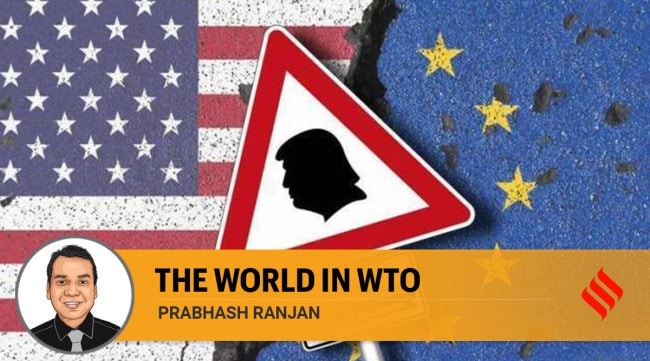Opinion How India can lead multilateralism at WTO
Prabhash Ranjan writes: Trade multilateralism might be out of fashion for the US, but remains of vital salience for countries like India. Hence, India, under its G20 presidency, should work with others to drive the WTO reforms agenda aimed at making trade multilateralism inclusive
 Prabhash Ranjan writes: Trade multilateralism might be out of fashion, but remains of vital salience for countries like India (File)
Prabhash Ranjan writes: Trade multilateralism might be out of fashion, but remains of vital salience for countries like India (File) The recently concluded meeting of the G20 working group on trade and investment focused on the important issue of WTO reform. This has been on the global agenda for a while including that of the G20, whose members are key players in the WTO. However, any talk of WTO reform should not lose sight of the larger global context.
More than 50 years ago, Harvard professor Richard Cooper argued that “trade policy is foreign policy”. The world then valued economic interdependence with the belief that such interdependence would deter security confrontation. The WTO, created in that era, was aimed at legalising and policing economic interdependence. However, today’s world is dominated by geoeconomic considerations and heightened securitisation of international economic relations. The pursuit of unilateralism in international economic relations, especially by developed countries like the US, is on the rise with scant regard for WTO law.
Economic policies such as industrial subsidies and local content requirements have made a roaring comeback; forgotten WTO rules like security exceptions now occupy centre stage; and there is a deliberate effort to weaken trade multilateralism in favour of external plurilateral alignments keeping the big power confrontation in mind. As Jeffrey Schott of the Peterson Institute argues, in this milieu, it is naïve to believe that the developed G20 countries are interested in reforming the WTO for the better. A weak WTO perfectly suits the US as part of its foreign policy aimed at strategic rivalry with China.
Against this background, as Schott argues, the push for WTO reforms must come from G20’s “middle powers” such as India, Indonesia, Brazil, and South Africa. While the term WTO reform means different things to different people, there are four critical areas that developing countries should focus on. First, one of the cardinal pillars of the international trading regime is the presence of special and differential treatment (SDT) principle in WTO agreements. Given the varying levels of development of different WTO member countries, SDT provisions give special rights to developing countries and obligate developed countries to treat the former more favourably.
However, according to lawyers Vineet Hegde and Jan Wouters, only 21 per cent of the SDT provisions in various WTO agreements oblige developed countries to actually provide differential treatment to developing countries. Most SDT provisions are couched in the best-endeavour language. SDT provisions need to be given more teeth and efforts to weaken this treaty-embedded right in the name of WTO reform should be opposed tooth and nail.
Second, the appellate body — the second tier of the WTO’s two-tiered dispute settlement body — remains paralysed since 2019 because of the US’s continued nonchalance. This is part of Washington’s overall game plan to dilute the policing part of the WTO, which, in turn, allows it to pursue trade unilateralism without many checks. However, the remaining G20 countries need to either persuade the US to change its position or resurrect the appellate body without the US.
Third, given the slowness of the consensus-based decision-making in the WTO, from 2017 onward, there has been a shift away from this principle toward plurilateral discussions on select issues such as investment facilitation. While the plurilateral approach is a welcome development for rule-making, there is a need to develop a multilateral governance framework for plurilateral agreements, as Bernard Hoekman argues. This governance framework should include key principles of non-discrimination, transparency, and inclusivity in incorporating the results of plurilateral negotiations in the WTO rulebook. Forcing plurilateral agreements on non-willing members will accentuate the trust deficit between developed and developing countries.
Fourth, it is imperative to address the transparency gap in the WTO, especially in terms of notification requirements. Although WTO member countries are obliged to notify all their laws and regulations that affect trade, compliance with this obligation is poor. This increases the cost of trade, especially for developing countries.
Trade multilateralism might be out of fashion, but remains of vital salience for countries like India. Hence, India, under its Presidency of the G20, should work with others to drive the WTO reforms agenda aimed at making trade multilateralism inclusive.
The writer teaches at the South Asian University. Views are personal






